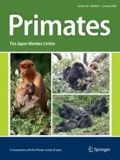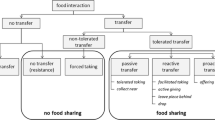Abstract
Little evidence of calculated reciprocity has been found in non-human primates so far. In this study, we used a simple experimental set-up to test whether partners pulled a sliding table to altruistically provide food to each other in short-term interactions. We tested 46 dyads of chimpanzees, bonobos, gorillas, orangutans, brown capuchin monkeys and spider monkeys to examine whether a subject’s tendency to provide food to a partner was directly affected by the partner’s previous behaviour, by the species, by the condition (i.e., whether the partner could access the food provided by the subject) and by the social tolerance levels within each dyad. Chimpanzees and orangutans were the only species pulling significantly more when the partner could retrieve the food altruistically provided. However, no species reciprocated food exchanges, as subjects’ probability to pull was not affected by the previous number of the partner’s pulls, with the possible exception of one orangutan dyad. Although subjects clearly knew how the apparatus worked and easily obtained food for themselves, individuals did not usually take the opportunity to provide food to their partners, suggesting that calculated reciprocity is not a common behaviour and that food exchanges are usually not reciprocated in the short-term within dyads.




Similar content being viewed by others
References
Addessi E, Crescimbene L, Visalberghi E (2008) Food and token quantity discrimination in capuchin monkeys (Cebus apella). Anim Cogn 11:275–282
Addessi E, Paglieri F, Focaroli V (2011) The ecological rationality of delay tolerance: insights from capuchin monkeys. Cognition 119:142–147
Amici F, Aureli F, Call J (2008) Fission-fusion dynamics, behavioral flexibility and inhibitory control in primates. Curr Biol 18:1415–1419
Amici F, Aureli F, Call J (2010) Monkeys and apes: are their cognitive skills really so different? Am J Phys Anthropol 143:188–197
Amici F, Call J, Aureli F (2012) Aversion to violation of expectations of food distribution: the role of social tolerance and relative dominance in seven primate species. Behaviour 149:345–368
Baayen RH (2008) Analyzing linguistic data. Cambridge University Press, Cambridge
Bates D, Maechler M, Bolker B (2013) lme4: linear mixed-effects models using S4 classes. R package version 0.999999-2
Beran MJ (2001) Summation and numerousness judgments of sequentially presented sets of items by chimpanzees (Pan troglodytes). J Comp Psychol 115:181–191
Brosnan SF, de Waal FBM (2002) A proximate perspective on reciprocal altruism. Hum Nat 13:129–152
Brosnan SF, Silk JB, Henrich J, Mareno MC, Lambeth SP, Schapiro SJ (2009) Chimpanzees (Pan troglodytes) do not develop contingent reciprocity in an experimental task. Anim Cogn 12:587–597
Burkart JM, van Schaik CP (2010) Cognitive consequences of cooperative breeding in primates? Anim Cogn 13:1–19
Burkart JM, Fehr E, Efferson C, van Schaik CP (2007) Other-regarding preferences in a non-human primate: common marmosets provision food altruistically. Proc Natl Acad Sci USA 104:19762–19766
Burkart JM, Hrdy SB, van Schaik CP (2009) Cooperative breeding and human cognitive evolution. Evol Anthropol 18:175–186
Call J (2000) Estimating and operating on discrete quantities in orangutans (Pongo pygmaeus). J Comp Psychol 114:136–147
Cheney DL, Moscovice LR, Heesen M, Mundry R, Seyfarth RM (2010) Contingent cooperation between wild female baboons. Proc Natl Acad Sci USA 107:9562–9566
Clutton-Brock TH (2009) Cooperation between non-kin in animal societies. Nature 462:51–57
de Waal FBM (1997) The chimpanzee’s service economy: food for grooming. Evol Hum Behav 18:375–386
de Waal FBM, Luttrell LM (1988) Mechanisms of social reciprocity in three primate species: symmetrical relationship characteristics or cognition? Ethol Sociobiol 9:101–118
Dobson AJ (2002) An introduction to generalized linear models. Chapman & Hall/CRC, Boca Raton
Dufour V, Pelé M, Neumann M, Thierry B, Call J (2009) Calculated reciprocity after all: computation behind token transfers in orangutans. Biol Lett 5:172–175
Field A (2005) Discovering statistics using SPSS. Sage Publications, London
Forstmeier W, Schielzeth H (2011) Cryptic multiple hypotheses testing in linear models: overestimated effect sizes and the winner’s curse. Behav Ecol Sociobiol 65:47–55
Fox J, Weisberg S (2011) An R companion to applied regression, 2nd edn. Sage, Thousand Oaks
Freeman EW, Schulte BA, Brown JL (2010) Using behavioral observations and keeper questionnaires to assess social relationships among captive female African elephants. Zoo Biol 29:140–153
Gomes CM, Mundry R, Boesch C (2009) Long-term reciprocation of grooming in wild West-African chimpanzees. Proc R Soc B 276:699–706
Hattori Y, Kuroshima H, Fujita K (2005) Cooperative problem solving by tufted capuchin monkeys (Cebus apella): spontaneous division of labor, communication and reciprocal altruism. J Comp Psychol 119:335–342
Hauser MD, Chen MK, Chen F, Chuang E (2003) Give unto others: genetically unrelated cotton-top tamarin monkeys preferentially give food to those who altruistically give food back. Proc R Soc B 270:2363–2370
Hemelrijk CK (1994) Support for being groomed in long-tailed macaques, Macaca fascicularis. Anim Behav 48:479–481
Herrelko ES, Vick SJ, Buchanan-Smith HM (2012) Cognitive research in zoo-housed chimpanzees: influence of personality and impact on welfare. Am J Primatol 74:828–840
Jaeggi AV, Gurven M (2013) Reciprocity explains food sharing in humans and other primates independent of kin selection and tolerated scrounging: a phylogenetic meta-analysis. Proc R Soc B 280:20131615
Jensen K, Hare B, Call J, Tomasello M (2006) What’s in it for me? Self-regard precludes altruism and spite in chimpanzees. Proc R Soc B 273:1013–1021
Koyama NF, Caws C, Aureli F (2006) Interchange of grooming and agonistic support in chimpanzees. Int J Primatol 27:1293–1309
Lakshminarayanan VR, Santos LR (2008) Capuchin monkeys are sensitive to others’ welfare. Curr Biol 18:R999–R1000
McCullagh P, Nelder JA (2008) Generalized linear models. Chapman and Hall, London
Melis AP, Hare B, Tomasello M (2006) Chimpanzees recruit the best collaborators. Science 311:1297–1300
Melis AP, Hare B, Tomasello M (2008) Do chimpanzees reciprocate received favours? Anim Behav 76:951–962
Pelé M, Dufour V, Thierry B, Call J (2009) Token transfers among great apes: species differences, gestural requests and reciprocal exchange. J Comp Psychol 123:375–384
Quinn GP, Keough MJ (2002) Experimental designs and data analysis for biologists. Cambridge University Press, Cambridge
R Core Team (2013) R: a language and environment for statistical computing. R Foundation for Statistical Computing, Vienna
Sabbatini G, de Bortoli Vizioli A, Visalberghi E, Schino G (2012) Food transfers in capuchin monkeys: an experiment on partner choice. Biol Lett 8:757–759
Savage-Rumbaugh ES, Rumbaugh D, Boysen S (1978) Linguistically mediated tool use and exchange by chimpanzees (Pan troglodytes). Behav Brain Sci 4:539–554
Schielzeth H, Forstmeier W (2009) Conclusions beyond support: overconfident estimates in mixed models. Behav Ecol 20:416–420
Schino G, Aureli F (2008) Grooming reciprocation among female primates: a meta-analysis. Biol Lett 4:9–11
Schino G, Aureli F (2009) Reciprocal altruism in primates: partner choice, cognition and emotions. Adv Stud Behav 39:45–69
Schino G, Aureli F (2010a) Primate reciprocity and its cognitive requirements. Evol Anthropol 19:130–135
Schino G, Aureli F (2010b) The relative roles of kinship and reciprocity in explaining primate altruism. Ecol Lett 13:45–50
Schino G, Pellegrini B (2009) Grooming in mandrills and the time frame of reciprocal partner choice. Am J Primatol 71:884–888
Silk JB (2003) Cooperation without counting: the puzzle of friendship. In: Hammerstein P (ed) Genetic and cultural evolution of cooperation. MIT Press, Cambridge, pp 37–54
Silk JB, Brosnan SF, Vonk J, Henrich J, Povinelli DJ, Richardson AS, Lambeth SP, Mascaro J, Shapiro SJ (2005) Chimpanzees are indifferent to the welfare of unrelated group members. Nature 27:1357–1359
Silk JB, Brosnan SF, Henrich J, Lambeth SP, Shapiro SJ (2013) Chimpanzees share food for many reasons: the role of kinship, reciprocity, social bonds and harassment on food transfers. Anim Behav 85:941–947
Stevens JR (2010) Donor payoffs and other-regarding preferences in cotton-top tamarins (Saguinus oedipus). Anim Cogn 13:663–670
Stevens JR, Hauser MD (2004) Why be nice? Psychological constraints on the evolution of cooperation. Trends Cogn Sci 8:60–65
Tan J, Hare B (2013) Bonobos share with strangers. PLoS ONE 8(1):e51922. doi:10.1371/journal.pone.0051922
Trivers RL (1971) The evolution of reciprocal altruism. Q Rev Biol 46:35–57
Vonk J, Brosnan SF, Silk JB, Henrich J, Richardson AS, Lambeth SP, Schapiro SJ, Povinelli DJ (2008) Chimpanzees do not take advantage of very low cost opportunities to deliver food to unrelated group members. Anim Behav 75:1757–1770
Yamamoto S, Tanaka M (2009) Do chimpanzees (Pan troglodytes) spontaneously take turns in a reciprocal cooperation task? J Comp Psychol 123:242–249
Yamamoto S, Tanaka M (2010) The influence of kin relationship and reciprocal context on chimpanzees’ other-regarding preferences. Anim Behav 79:595–602
Acknowledgments
This work was conducted while the first author held a Humboldt Research Fellowship for Postdoctoral Researchers (Humboldt ID number 1138999). We thank Elisabetta Visalberghi, Roberto Pacheco Mendez, Fernando Victoria Arceo, Iber Rodriguez Castillo and all the animal keepers at the different facilities for endless support and cooperation. Thanks to Sebastian Egner for coding data for inter-observer reliability purposes and to Hanna Petschauer for helping wonderfully with organizing data collection. This study complies with the ethical standards as laid down by the Primate Society of Japan and was ethically approved by an internal committee at the Max Planck Institute for Evolutionary Anthropology in Leipzig, Germany.
Author information
Authors and Affiliations
Corresponding author
Electronic supplementary material
Below is the link to the electronic supplementary material.
About this article
Cite this article
Amici, F., Aureli, F., Mundry, R. et al. Calculated reciprocity? A comparative test with six primate species. Primates 55, 447–457 (2014). https://doi.org/10.1007/s10329-014-0424-4
Received:
Accepted:
Published:
Issue Date:
DOI: https://doi.org/10.1007/s10329-014-0424-4




